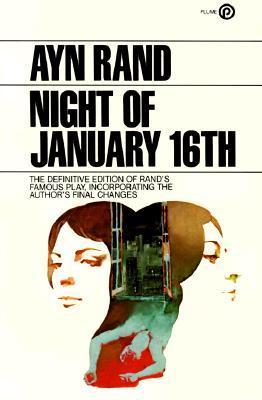
The definitive edition of Ayn Rand's famous play, incorporating the author's final changes. On one level, Night of January 16th is a totally gripping drama about the rise and destruction of a brilliant and ruthless man. On a deeper level, it is a superb dramatic objectification of Ayn Rand's vision of human strength and weakness. Since its original Broadway success, it has achieved vast worldwide popularity and acclaim. To the world, he was a startlingly successful international tycoon, head of a vast financial empire. To his beautiful secretary-mistress, he was a god-like hero to be served with her mind, soul and body. To his aristocratic young wife, he was an elemental force of nature to be tamed. To his millionaire father-in-law, he was a giant whose single error could be used to destroy him. What kind of man was Bjorn Faulkner? Only you, the reader, can decide.
Author

Polemical novels, such as The Fountainhead (1943), of primarily known Russian-born American writer Ayn Rand, originally Alisa Rosenbaum, espouse the doctrines of objectivism and political libertarianism. Alisa Rosenbaum entered into a prosperous Jewish family before Russian revolution. When the Bolsheviks requisitioned the pharmacy that Fronz Rosenbaum, her father, owned, the family fled to the Crimea. Alisa returned to the city, renamed Leningrad, to attend the university, but relatives already settled in America and in 1926 offered her the chance of joining them. With money from the sale of jewelry of her mother, Alisa bought a ticket to New York. On arrival at Ellis Island, she changed into Ayn (after a name of some Finnish author, probably "Aino") Rand (a supposed abbreviation of her Russian surname). She moved swiftly to Hollywood, where she learned English, worked in the RKO wardrobe department and as an extra, and wrote through the night on screenplays and novels. Because her original visa as a visitor expired, she also married a "beautiful" bit-part actor, called Frank O'Connor. Rand sold her first screenplay in 1932, but nobody bought We the Living (1936), her first novel and a melodrama, set in Russia. Her first real success was The Fountainhead (rejected by more than ten publishers before publication in 1943). She started a new philosophy, known as objectivism, opposed to state interference of all kinds, and her follow-up novel Atlas Shrugged (1957) describes a group who attempt to escape conspiracy of mediocrity of America. Objectivism has been an influence on various other movements such as Libertarianism, and Rand's vocal support for Laissez-faire Capitalism and the free market has earned her a distinct spot among American philosophers, and philosophers in general.